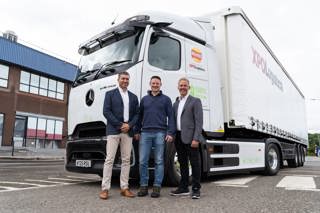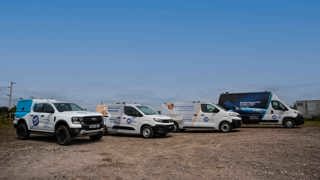Target Zero
Road risk has been a big focus and Enterprise has a ‘Target Zero’ campaign which aims to eliminate accidents that cause injuries to people.
Farrell says the deadline for Target Zero is “today and every day”.
In the past 13 months Enterprise has reduced its accident rate and costs by about 15%. The first step was putting a road risk steering committee in place, led by health and safety with representatives from fleet, insurance and operations, and backing from the board.
“Board backing and support is essential for programmes such as these,” said Farrell. “Our steering group is led by our health and safety director which ensures support”
Analysis by the steering group and Enterprise’s insurers Aviva and brokers Marsh led to a number initiatives, including strengthening and enforcing HR policies; introducing a driver handbook; risk profiling of drivers based on claims history, age, convictions and activity; and formal assessment and education following incidents.
Enterprise has monthly internal campaigns about driving safely, alongside health and safety campaigns.
“We’re treating it the same as health and safety in the workplace because the vehicle is a workplace,” he says.
“The challenge for fleets is that drivers and management don’t always see the vehicle as workplace and while your attitude is slanted in that way it’s almost excusable to have a collision in a vehicle.”
Enterprise has also restructured the insurance policy and changed the way claims are handled and administered.
Claims statistics with trend analysis are distributed to every level of the business. There has been a substantial improvement in loss ratios and damages.
“The big thing for me is that our drivers are safe and our people going out on the road in the morning are going to come home,” Farrell says.
Next step
Marsh has performed a road risk gap analysis to identify the next steps to improvement and Farrell says there will be “a big push on driver behaviour” this year.
Enterprise is also working with the Energy Saving Trust to lower the carbon footprint of its fleet.
Speed limiters have already been fitted and Enterprise is now introducing engine remapping on particular vehicles which should deliver a £350,000 fuel saving.
“2012 is about carrying on the foundation work and getting further savings,” Farrell says.
Fleet diversity
Enterprise provides maintenance and front line services to the public sector and utility industry.
Its services range from refuse collection and deploying gritters to managing parks and open spaces for local authorities.
The diversity of the fleet requires a range of funding methods, seeing outright purchase, finance lease, operating lease and flexi rental featuring in how Enterprise procures vehicles.
With a fleet capital replacement value of £180 million funding always ranks highly on the company’s list of priorities.
Farrell says while banks are still extremely cautious about lending across the asset finance sector, Enterprise is proving more attractive to asset funders as its revenue is derived from government spend or regulated spend in the utility sector.
One of the advantages of having such a diverse fleet is that Enterprise can trial a number of alternative technologies.
It has set up an innovations group, which is currently trialling hydrogen fuel cells.
“We think it’s the future,” Farrell says. “We think it can be applied at closed sites such armed forces bases where we have maintenance people doing 50 to 60 miles, but it needs some development.”
Switching to Hyundai
Enterprise has struck an innovative deal with Hyundai which means more than 500 business need drivers will be moving into i40s and i30s in 2012.
Vauxhall was the preferred manufacturer, but Hyundai’s five-year warranty and wholelife costs made it an attractive proposition.
Growth plans
By the end of this year Farrell anticipates the fleet growing from 6,500 vehicles to 8,500 due to organic growth from business wins and the adoption of government fleets.
Farrell says more public sector organisations are showing interest in outsourcing their fleet and he estimates that within the existing 96 local authorities Enterprise does work for there is a market of £100-£150 million to pursue.
Enterprise already does fleet management at various levels (from basic provision of a vehicle through to financing, maintenance and wholelife management) for approximately 50 organisations.
Farrell wants to move more towards consultancy services and replicate Enterprise’s success with customer’s fleets.





















Login to comment
Comments
No comments have been made yet.